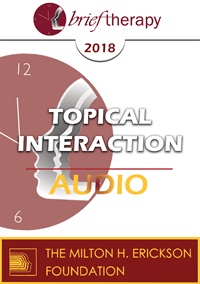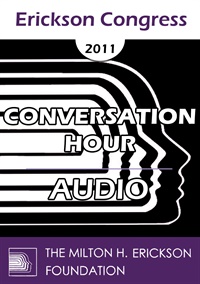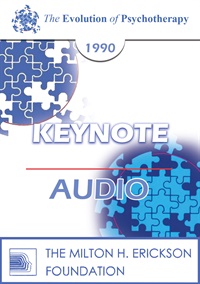- Average Rating:
- Not yet rated
- Topic Areas:
- Femininity | Gender | Invited Addresses
- Categories:
- Evolution of Psychotherapy | Evolution of Psychotherapy 2021
- Faculty:
- Carol Gilligan
- Course Levels:
- Master Degree or Higher in Health-Related Field
- Duration:
- 1 hour
- Format:
- Audio and Video
- Original Program Date:
- Dec 03, 2021
- Short Description:
- Has research on girls' development changed our understanding of women's psychology? What are we to make of the frank and fearless voices of girls such as Greta Thunberg (with her climate strike) and Amanda Gorman (the poet at Biden's inauguration)? How can we understand women's silences?
- Price:
- $59.00 - Base Price

- Average Rating:
- Not yet rated
- Topic Areas:
- Topical Interactions | Psychotherapy | Femininity | Supervision
- Categories:
- Brief Therapy Conference | Brief Therapy Conference 2018
- Faculty:
- Laura Brown, PhD
- Duration:
- 57:06
- Format:
- Audio Only
- Original Program Date:
- Dec 08, 2018
- Short Description:
- There is a dynamic tension between the necessarily hierarchical structure of psychotherapy supervision and the liberatory/egalitarian models of feminist and other liberatory practices. This will be a chance for psychotherapy supervisors who are struggling with this dilemma to discuss this topic with the author of the feminist model of psychotherapy supervision
- Price:
- $15.00 - Base Price
Tags: Feminine Psychotherapy Supervision
Credit available - Click Here for more information
- Average Rating:
- Not yet rated
- Topic Areas:
- Speeches | Gender | Femininity | Masculinity | Relationships
- Categories:
- Evolution of Psychotherapy | Evolution of Psychotherapy 2017 | Online Continuing Education
- Faculty:
- Marilyn Yalom, PhD
- Course Levels:
- Master Degree or Higher in Health-Related Field
- Duration:
- 1:00:05
- Format:
- Audio and Video
- Original Program Date:
- Dec 15, 2017
- Short Description:
- The prominence of women as friends would have surprised people living in the distant past and would still surprise people in certain parts of the world, where only male friendship is prized. Yet, if you ask Americans today whether men or women have more friends, the answer is likely to be women. I shall examine the ingredients that seem basic to women’s friendships and suggest ways in which friendships between women (and between women and men) may be the saving grace in our present lives. I shall also examine the concept of friendship more generally as it has been understood in the western tradition since Aristotle. What are the benefits of friendship? Is it possible to live well without friends? What can women learn from male friendships and men learn from female friendships?
- Price:
-
Sale is $29.00
price reduced from Base Price - $59.00
Credit available - Click Here for more information
- Average Rating:
- Not yet rated
- Topic Areas:
- Great Debates | Gender | Masculinity | Femininity | Psychotherapy
- Categories:
- Evolution of Psychotherapy | Evolution of Psychotherapy 2017 | Online Continuing Education
- Faculty:
- Esther Perel, MA, LMFT | Marilyn Yalom, PhD
- Course Levels:
- Master Degree or Higher in Health-Related Field
- Duration:
- 1:21:00
- Format:
- Audio and Video
- Original Program Date:
- Dec 14, 2017
- Short Description:
- EP17 Great Debates 11 - Masculine/Feminine: Then and Now - Esther Perel, MA, LMFT and Marilyn Yalom, PhD Tennyson, in a nineteenth-century poem, expressed the firm belief in the difference between men and women. Man for the field and woman for the heart: Man for the sword and for the needle she: Man with the head and woman with the heart: Man to command and woman to obey. During the twentieth century, this doctrine of separate spheres was steadily eroded so that by now, in the Western world, woman are expected to use their brains as well as their hearts and men are encouraged to assume some of the roles previously allotted exclusively to women. This dialogue between Esther Perel and Marilyn Yalom will explore the challenges that men and women now face in assuming traits and roles of the opposite gender. Are we edging towards a more androgynous definition of gender and a multiplicity of gender identities? What are the lingering gaps in gender inequality? Is there a “crisis of mascu
- Price:
-
Sale is $29.00
price reduced from Base Price - $59.00

- Average Rating:
- Not yet rated
- Topic Areas:
- Conversation Hours | Femininity | Gender
- Categories:
- Erickson Congress | Erickson Congress 2011
- Faculty:
- Consuelo Casula, Dipl. Psych
- Duration:
- 54:15
- Format:
- Audio Only
- Original Program Date:
- Dec 10, 2011
- Short Description:
- IC11 Conversation Hour 06 – How Erickson Treated Women – Consuelo Casula, Lic. Psych
- Price:
- $15.00 - Base Price

- Average Rating:
- Not yet rated
- Topic Areas:
- Ericksonian Psychotherapy | Psychotherapy | Short Courses | Ericksonian Hypnosis and Therapy Techniques | Femininity
- Categories:
- Erickson Congress | Erickson Congress 2011
- Faculty:
- Maria Escalante de Smith, MA
- Duration:
- 1:22:02
- Format:
- Audio Only
- Original Program Date:
- Dec 09, 2011
- Short Description:
- When women face unexpected pregnancies, they may experience a variety of feelings. Ericksonian techniques can help them consider alternatives. Short crises interventions such as future rehearsal and utilization will also be discussed as Ericksonian tools to be used during single session therapy. Participants will be able to discuss different alternatives such as adoption and ways to help keep their baby will be promoted. Age regression for coping with post-abortion syndrome will be described.
- Price:
- $15.00 - Base Price

- Average Rating:
- Not yet rated
- Topic Areas:
- Workshops | Femininity | Gender | Ericksonian Hypnosis and Therapy Techniques
- Categories:
- Erickson Congress | Erickson Congress 2011
- Faculty:
- Consuelo Casula, Dipl. Psych
- Duration:
- 59 Minutes
- Format:
- Audio Only
- Original Program Date:
- Dec 07, 2011
- Short Description:
- Women bring to therapy problems and difficulties caused by social, technological and moral changes, and the therapist needs to face them with new Ericksonian methods. Modern society offers women many possibilities, sends ambiguous messages regarding customs and values; therapy faces issues of integrity, ethics and authenticity, transforming faults into virtues.
- Price:
- $20.00 - Base Price

- Average Rating:
- Not yet rated
- Topic Areas:
- Workshops | Brief Therapy | Communication | Femininity | Masculinity | Couples Therapy | Relationships
- Categories:
- Brief Therapy Conference | Brief Therapy Conference 2006
- Faculty:
- Pat Love, EdD
- Duration:
- 2:29:51
- Format:
- Audio Only
- Original Program Date:
- Dec 10, 2006
- Short Description:
- A relationship can fail without conscious intent unless you understand the two major forces underlying resentment and alienation. Come learn how one shift in perception and three simple techniques can create harmony and happiness at home and work. This workshop will include lecture, video, practical handouts, experiential exercise and discussion.
- Price:
- $15.00 - Base Price

- Average Rating:
- Not yet rated
- Topic Areas:
- Workshops | Femininity | Sex and Sexuality | Gender | Abuse | Psychotherapy
- Categories:
- Evolution of Psychotherapy | Evolution of Psychotherapy 1995
- Faculty:
- Lenore Walker, EdD
- Duration:
- 2 Hours 8 Minutes
- Format:
- Audio Only
- Original Program Date:
- Dec 13, 1995
- Short Description:
- Presentation of the principles of feminist therapy as utilized with women who have been battered, sexually abused as children or adults. Such techniques also can be used to treat sexual misconduct by therapists and sexual harassment, including dealing with issues such as dissociation, obsessions and cognitive distortions.
- Price:
- $15.00 - Base Price

- Average Rating:
- Not yet rated
- Topic Areas:
- Keynotes | Community | Femininity | Gender | Masculinity | Social Issues | Psychotherapy
- Categories:
- Evolution of Psychotherapy | Evolution of Psychotherapy 1990
- Faculty:
- Betty Friedan
- Duration:
- 1 Hour 6 Minutes
- Format:
- Audio Only
- Original Program Date:
- Dec 16, 1990
- Short Description:
- The enormous changes brought about in the last 25 years by the women's movement and the sex role revolution have opened new possibilities and problems-sources of conflict and new strengths for women, men and families. There is a challenge now for psychotherapists to break through their own remnant stereotypes of feminine mystique, masculine mystique, and obsolete assumptions about family so that they may distinguish between personal and political pathology and help evolving women, men and families find and use more consciously their new strengths and confront real problems realistically.
- Price:
- $15.00 - Base Price

- Average Rating:
- Not yet rated
- Topic Areas:
- Workshops | Psychotherapy | Femininity | Gender | Special Topics | History of Psychotherapy
- Categories:
- Evolution of Psychotherapy 1985 | Evolution of Psychotherapy
- Faculty:
- Sophie Freud, PhD
- Duration:
- 2 Hours 12 Minutes
- Format:
- Audio Only
- Original Program Date:
- Dec 15, 1985
- Short Description:
- Workshop 31 - A Feminist Perspective on Psychotherapy, featuring Sophie Freud. A special workshop presentation from Sophie Freud at the 1985 Evolution of Psychotherapy Conference.
- Price:
- $15.00 - Base Price




